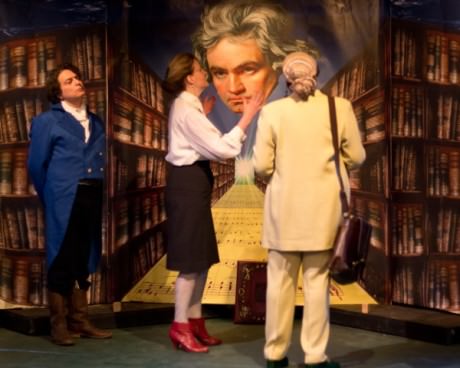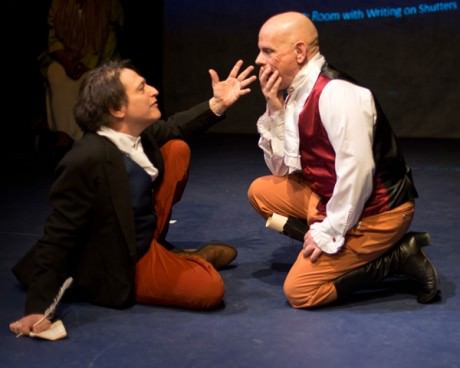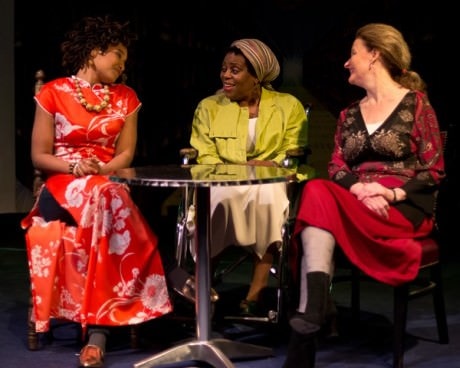The Creation of Art. The Wrestle with Death. 33 Variations, Moisés Kauffman’s Tony nominated play, juxtaposes those two turbulences.
In one — circa 1820 in Vienna, Austria — Ludwig van Beethoven wrestles with an inspiration, his composition of the Diabelli Variations (33 variations on a waltz composed by Anton Diabelli). His biggest obstacle during the process — besides the ambition of the project itself — is that the composer goes totally deaf after 25 years of gradual loss.

In the other — circa the present, in New York City and Bonn, Germany — musicologist Katherine Brandt, PhD, is creating an academic paper, a response to her query: Why did Beethoven decide to compose a variation on a second rate waltz, much less 33 of them? Her biggest obstacle — besides the squishiness of the question itself — is the fact that she has Lou Gehrig’s disease or ALS.
Silver Spring Stage’s seven-person ensemble performs Kauffman’s multilayered piece with clarity and imagination, taking their audience around the world and back and forth in time.
For DC MetroTheatreArts’ review click here.
The results are a kind of homage to great artistry (Beethoven’s) and to the passion that it brings to a person’s struggle to make a meaningful life. The play also reveals the pain that obsession brings to those who love the obsessed artist or musicologist.
As the professor works to answer her question concerning the maestro’s composition, her daughter, Clara, must suffer the disrespect that her mother unleashes on her, a daughter that she considers talented but-not-living-up-to-expectations.
The difference is really between that of an academic specialist, Brandt, and a renaissance person, i.e., a multitalented artist. For Clara seems to do well at whatever artistic medium she picks up, be it music, or costume design, or painting. No mention is made of the girl’s long-deceased father’s profession, but perhaps he too was an artist of some kind.
Although the script touches on many themes, and takes us around the world and through the centuries, the central story is between the professor and her estranged daughter, as that is the story given the fullest treatment and the greatest context. Fortunately, for the story, Clara will not give up on her mother, even though the mother gives little indication that she will ever reciprocate her daughter’s love and devotion.

Driven by the knowledge that her mother has only a short time remaining in her life, Clara abandons her own life in New York and tries one last time to receive some small token of respect from her high-minded mother. She will take care of her mother in Bonn.
To be sure, the mother courageously pushes forward with her investigation even as ALS ravages her. That’s right! Forget the Ice Bucket Challenge of recent “pop” media fame! The disease attacks the motor neurons and usually ends in paralysis. Professor Brandt will not, however, let imbalance, difficulty moving, thickening speech stop her from her quest.
At first she thinks that Beethoven did the 33 variations in order to mock Diabelli and his waltz. Such an elitist assumption belittles Beethoven who surely had better things to do with the last years of his life than mock his publisher Diabelli and the waltz’s composer. Fortunately, the doctor musicologist learns something from her “renaissance” daughter, who likes Diabelli’s waltz, for its lively tune: meaning, the musical piece was a popular construction and that a person “could dance to it.”
With the French revolution (and of course the American revolution) inspiring democratic upheaval and a resurgence in the idea of populist culture, Beethoven it seems might have been inspired by Diabelli’s “beer hall” waltz just because it wasn’t “very good” by the aristocratic or the academe’s standards. It was a people’s construct.
The mother arrives at her answer with her daughter’s aid, and with the help of her daughter’s compassionate boyfriend, a nurse, whom — surprise, surprise — the mother disapproves of because he is not accomplished enough. The fact that he leaves his job and spends months caring for the musicologist is never even mentioned by the professor.

For anyone who has had to help a family member deal with a deadly disease, the play will touch them. For anyone who has had to struggle to earn the respect of a mother or father who disagrees with his or her life choices, the play will resonate.
Most of all, however, for anyone who has witnessed the affirmation that passion gives to an otherwise pointless existence, 33 Variations will give reassurance that as inexplicable as passion usually is, or as open as it might be to misinterpretation by the outside world, or has hurtful as it might be to those who love the passionate, that their pursuit is worthwhile.
We can only hope that in the end the passionate will offer a little more gratitude to the compassionate who help ease their pain and suffering.
33 Variations plays through March 21, 2015 at Silver Spring Stage – 10145 Colesville Road, in Silver Spring, MD, located in the Woodmoor Shopping Center. For tickets, purchase them at the box office, or online.
LINK
Obsession and Transcendence: ’33 Variations’ Opens on Friday Night at Silver Spring Stage by Lennie Magida.





